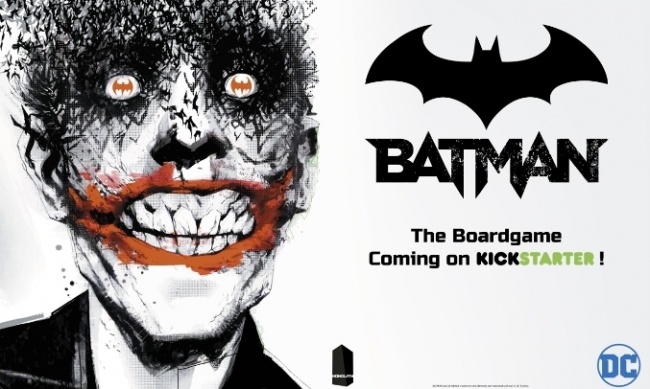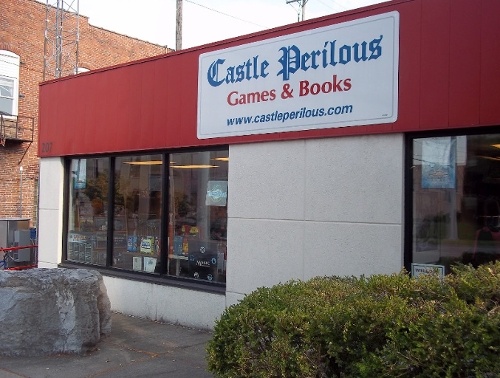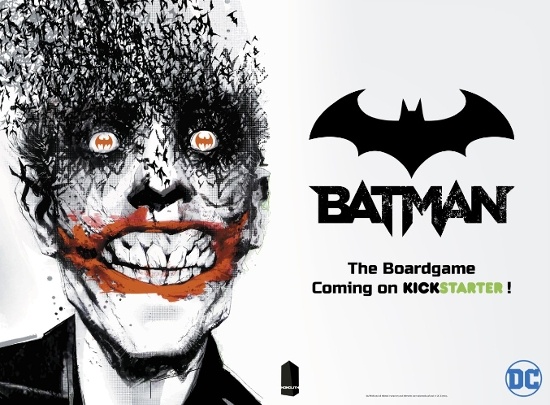Rolling for Initiative is a weekly column by Scott Thorne, PhD, owner of Castle Perilous Games & Books in Carbondale, Illinois and instructor in marketing at Southeast Missouri State University. This week, Thorne Monolith's decision to forgo trade distribution on its Batman boardgame.
This past week, Monolith, publisher of the Conan and Mythic Battles board games, announced that their recently previewed release Batman: The Board Game will sell through its Kickstarter campaign (launching probably early 2018) only, because of the costs associated with taking the game through the full distribution channel. From a post from the company on BoardGameGeek.com:
"We have decided to go "Kickstarter Exclusive" on our games including Mythic Battles: Pantheon (see "Mythic Games’ ‘Mythic Battles’ Reborn as ‘Mythic Battles: Pantheon’") because the deal to go to retail is not fair for us.
"If we want to offer Batman: The Board Game in retail, we would have to sell it to Asmodee at a fair price for our work, like any other board game publisher does. With all the intermediaries getting their own margin, the game would be sold around $250 in your local store. That is not something most of the local stores want to sell because it is a high price, and buying this from their distributors will immobilize a lot of their cash flow. They would rather buy 20 Spot It and be sure to sell them than offering a board game that already did (hopefully) well on Kickstarter.
"So, for the game to hit retail at a lower price, someone in the chain has to cut their margin and guess who…
"We could also downgrade the contents of the box but that would result in a weaker gameplay experience, which is not what we intend to do.
"The type of games we do is just not fit for the retail channel."
Monolith certainly does have a valid point, in that if they do not want to sell through the retail channel, the company is perfectly free to choose to do otherwise. Never mind the fact that Steamforged Games’ Dark Souls board game and Cephalofair Games’ Gloomhaven game, both big box and equally pricy boardgames, successfully sold through at retail without incurring a loss on each copy sold as Monolith did on their Conan game. From the BGG thread:
"But the Fact is that we are losing a huge amount of money in retail. Worst, each time we sell a Conan game in retail we lose money."
Steamforged Games and Cephalofair Games managed to sell their games at a price to ensure they made enough profit that both companies opted to distribute additional printings of their games through the specialty game channel. There are two reasons for opting to go through the specialty games retail channel that justify the costs or reduced margin to the publisher:
Shipping. Monolith will have to ship out all of its games individually to backers, incurring a freight charge on each game sold, which it may or may not pass along to the customer. Distribution channels are set up to do exactly this and can do it much more cheaply and efficiently than a publisher can.
Breaking bulk. Most games ship in case quantities, either 4 or 6. This is more efficient than shipping them one at a time and reduces costs (see reason 1). However, very few customers want more than one copy of a game (those that do want multiple copies likely plan to flip them on eBay or Amazon). Hence the retail channel is set up to efficiently break down those case quantities into units that the average customer wants to purchase.
Does Monolith have to sell through retail? Nope. Does Monolith need to sell through retail? The company’s past success with Kickstarter indicates no. Should it rethink the retail channel? Well, given that other companies with similar games use the channel successfully and fellow Kickstarter enthusiast CMON has started embracing retail, I would recommend giving the channel some more thought.
The opinions expressed in this column are solely those of the writer, and do not necessarily reflect the views of the editorial staff of ICv2.com.

Column by Scott Thorne
Posted by Scott Thorne on October 2, 2017 @ 1:27 am CT




